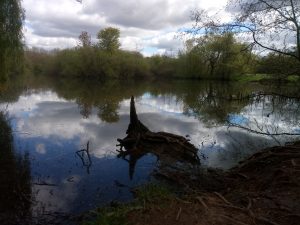
Leaf Litter
Not a ripple disturbs the pond
in the hospital grounds.
Yellow, it reflects
the withering trees.
Like a fresh skin, it’s unwrinkled
even this close to endings,
untrammelled by each repeating day’s
harsh human news.
Jaundiced by autumn
you and I slip hands,
witness the release
of another umber leaf.
Weightless, it falls
like a burden through the air
to drift on the pond’s
smooth surface.
(from Carol McKay’s Reading the Landscape, Hedgehog Press, 2022)